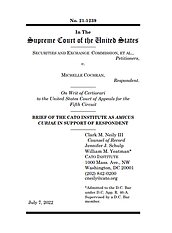More than six years later, her case drags on.
In the meantime, she pursued her constitutional claims in the federal court system, where she is represented by the New Civil Liberties Alliance. In 2019, a district court in Texas dismissed her complaint, reasoning that she must first exhaust the (interminable) administrative trial process, before she can get an Article III judge to weigh her constitutional arguments, which, again, challenge the very legitimacy of that (endless) administrative trial process.
A split three-judge panel on the Fifth Circuit affirmed, but the en banc (full) Fifth Circuit reversed, siding with Ms. Cochran and allowing her constitutional challenge to proceed in federal court. The government then petitioned for Supreme Court review, which was granted. On the merits, the government seeks to have Ms. Cochran restart the administrative process at step one.
Today, the Cato Institute filed a brief in support of the respondent. We highlight the SEC’s backlog of cases, which have been languishing before the agency for an average of six years, just like Ms. Cochran’s ongoing proceeding. The SEC’s unacceptable sluggishness forces her into a Catch-22: either she bets the farm on her constitutional claims by defaulting on the underlying allegations, and thereby “wins” her day in federal court to challenge the constitutionality of the agency’s proceeding; or she continues to litigate in the agency proceeding, which has lasted for more than six years so far and with no plausible end in sight. That is a choice worthy of Camus or Kafka, not America.




